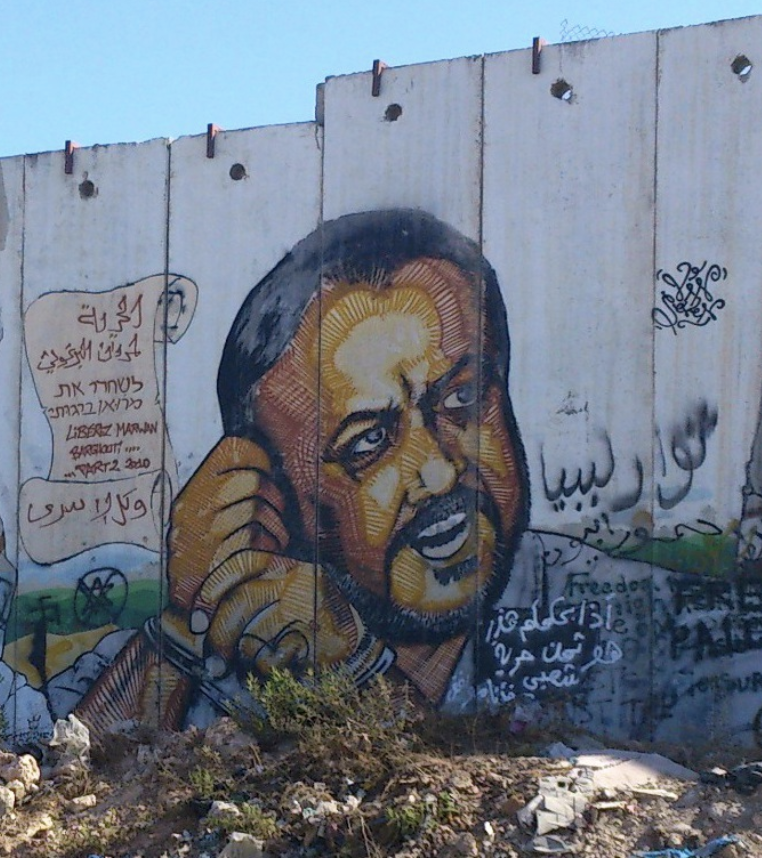Marwan Barghouti---The Palestinian Mandela

By Luke McMahan/ Arab America Contributing Writer
In a December poll of Palestinians, Marwan Barghouti (مروان البرغوثي), a prominent member of the liberation organization Fatah imprisoned for the last 22 years, was chosen as the most popular politician in Gaza and a desired successor to Mahmoud Abbas. Amid rumors a few months later that he would be released, Israeli Security Minister Itamar Ben-Gvir announced that he had been placed in solitary confinement. With the potential to unify Palestinians in a way made more necessary by every passing day of the war’s carnage, many call him the “Palestinian Mandela.”
Fatah Service
Born in 1958 in the West Bank village Kobar, Barghouti has actively supported Palestinian liberation and self-determination all his life. At 15, he joined Fatah and faced his first detention; three years later, he began a four year stint in an Israeli prison for participation in an armed group. In prison, according to a 1996 New York Times article, “he was beaten and kicked in the groin, made to stand for endless hours with a sack on his head, lay with his hands tied to an iron bar and was confined in a stifling cell with four or five other men”(NYTimes). While in prison, he finished his secondary degree and learned Hebrew, enrolling at Birzeit University upon release.
Part of Fatah’s young guard, whose influence rose after the deportations of Abbas and Yasser Arafat, he played a leading role in the First Intifada beginning in 1987, which led to his arrest and deportation to Jordan later that year. Finally allowed to return following the Oslo Peace Accords, he joined the Palestinian Legislative Council. During this period, he had great hopes about the peace agreement, calling it “the biggest step in our history”(NYTimes). During this time, his support only grew after he launched an investigation on rights abuses and corruption within Arafat’s security services and the government.
This idealism faded by 2000 following the Camp David Summit, which ended without an agreement. And by the beginning of the Second Intifada, Barghouti had become leader of Tanzim, Fatah’s armed brigade, in the West Bank. While still an ardent supporter of the two state solution and publicly denouncing attacks on Israeli soil, he wrote in a 2002 Washington Post article that he “reserve(s) the right to protect (him)self, to resist the Israeli occupation of (his) country and to fight for (his) freedom.” However, during the Intifada, the nascent Al-Aqsa Martyrs’ Brigade began targeting Israeli, soldiers, settlers, and citizens, some with suicide bombings. Israel then claimed Barghouti as the leader of the Brigade, which he denied.
After a Brigade statement seemingly confirmed Israel’s suspicions, Barghouti was arrested in Ramallah in April of 2002. Nearly killed in an Israeli assassination attempt a year previous, which claimed the life of his assistant, Barghouti now stood on trial for 26 counts of murder connected to the Brigade’s attacks. Throughout the proceedings, he steadfastly denied the legitimacy of the court and the charges against him, once shouting to the court in Hebrew that he desired to read his charges against Israel. Regardless, the court sentenced him to five life sentences and an additional 40 years (the longest possible sentence) for five counts of murder, conspiracy, and membership in a terrorist organization.
Imprisonment
Barghouti has remained active and influential in the fight for peace and Palestinian rights in prison. Among them, he helped negotiate a brief ceasefire between Palestinian factions in 2003 and played a significant role in writing the 2006 Palestinian Prisoners’ Document. The latter featured participation by representatives of Fatah, Hamas, Islamic Jihad, the Popular Front for the Liberation of Palestine (PFLP) and the Democratic Front for the Liberation of Palestine. In it, Barghouti continued his support of a two-state solution, recognizing Israel with the return of Palestine to its 1967 borders. In 2017, he organized a hunger strike along with over 1000 other prisoners in several Israeli jails, which he wrote about in a New York Times Op-Ed here.
Barghouti is another victim of systematic mistreatment and torture within Israeli prisons. After the Quds Press published a supposed message from him calling Palestinians to rise and resist, he was placed in solitary confinement and suffered further abuses. The Guardian reported earlier this year, with information from his lawyer, that he has sustained several injuries, has lost weight, and can no longer access the technology or contacts he used to maintain his influence from jail in the past.
Under normal circumstances, Barghouti’s ability to unite tempestuous Palestinian political factions and his previous recognitions of Israel as a state would supposedly help earn a premature release. Hamas even demanded that previous ceasefire deals include his freedom. But with Israel’s current heavily right-wing administration, wanting to further divide Palestinians and further encroach upon the 1967 borders, there is no end in sight to his detention.
Sources:
https://www.bbc.com/news/world-middle-east-13628771
https://www.theguardian.com/world/article/2024/may/18/israeli-abuse-of-jailed-palestinian-leader-marwan-barghouti-amounts-to-torture
https://www.aljazeera.com/news/2024/2/15/hold_hopes-diminish-that-pivotal-palestinian-leader-may-be-released
https://apnews.com/article/israel-hamas-palestinians-opinion-poll-wartime-views-a0baade915619cd070b5393844bc4514
Check out our Blog here!








